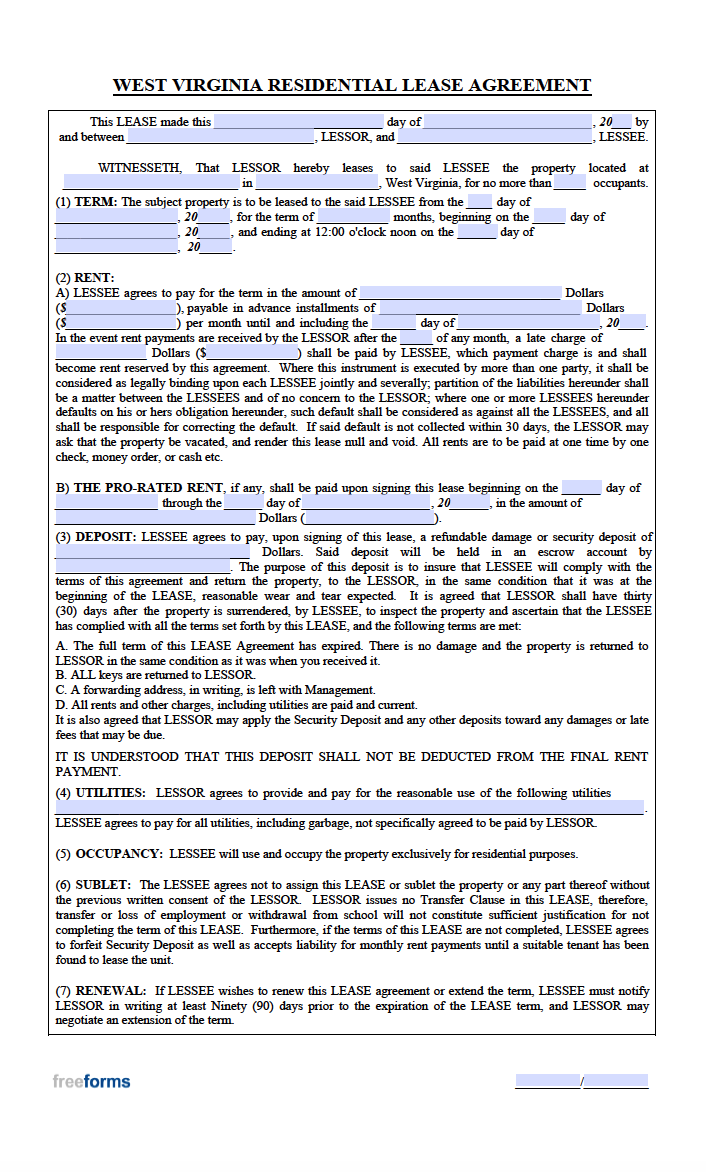The West Virginia lease agreement consists of a written lawful accord, outlining the lease conditions of a particular property. In many cases, the submission of a rental application will be necessary before moving forward to discuss terms of the lease. After the details of the contract are fine-tuned, the tenant and landlord will endorse the document to finalize the commitment.
Lease Agreements By Type
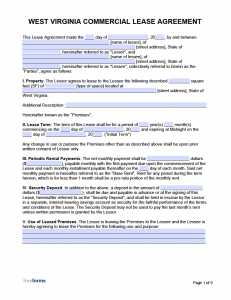 Commercial Lease Agreement – Contains the information about a rental arrangement of a building or space to be employed for business purposes.
Commercial Lease Agreement – Contains the information about a rental arrangement of a building or space to be employed for business purposes.
Download: PDF, Word (.docx)
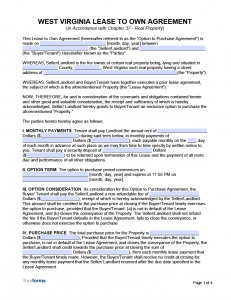 Lease to Own Agreement – A summarized framework of the contract involving a rental property with an additional condition allowing the lessee to acquire the option to purchase upon fulfillment.
Lease to Own Agreement – A summarized framework of the contract involving a rental property with an additional condition allowing the lessee to acquire the option to purchase upon fulfillment.
Download: PDF, Word (.docx)
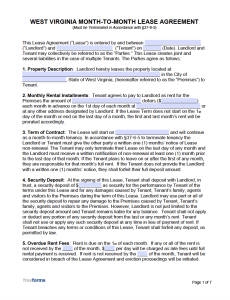 Month-to-Month Lease – Grants use of a property for an amount of time with an optional election to end the term with a minimum of 30-days written communication from either the lessee or lessor.
Month-to-Month Lease – Grants use of a property for an amount of time with an optional election to end the term with a minimum of 30-days written communication from either the lessee or lessor.
Download: PDF, Word (.docx)
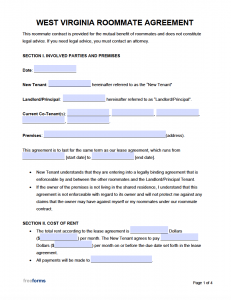 Roommate Agreement – Constructs promissory evidence of the acceptance to pay a monthly rental rate to reside in a designated quarter of a home.
Roommate Agreement – Constructs promissory evidence of the acceptance to pay a monthly rental rate to reside in a designated quarter of a home.
Download: PDF, Word (.docx)
Standard Lease Agreement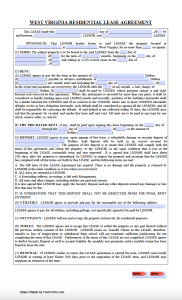 – Creates a fillable listing of the critical components of a residential rental arrangement.
– Creates a fillable listing of the critical components of a residential rental arrangement.
Download: PDF
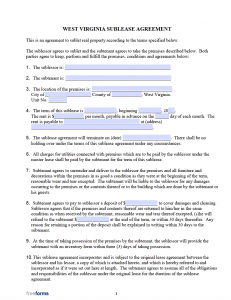 Sublease Agreement – Solidifies the acknowledgment of an individual to rent a property from the tenant that is currently renting.
Sublease Agreement – Solidifies the acknowledgment of an individual to rent a property from the tenant that is currently renting.
Download: PDF
Landlord-Tenant Laws
An account of the state statutes on the legalities surrounding the relationship between the lessor and lessee is detailed in the West Virginia Code Chapter 37 Article 6.
Required Landlord Disclosures
Non-Refundable Fees – Any charges due from the tenant that will not be reimbursed at the end of the lease must be explicitly disclosed as “non-refundable”. Security deposits will be understood as refundable unless resulting damages to the property require a portion or all of the funds to repair the issues.
Lead-Based Paint (42 U.S. Code § 4852d) – Homes built before 1978 that pose a threat for lead-based paint exposure must communicate this information within the literature of the rental contract. The lease agreement is required to include the government form attesting to the state of the property and danger presented by any hazardous paint.
When is Rent Late?
The state of West Virginia has not lawfully established a state-wide accepted period of grace. The lessor has the option to include a stipulated forgiveness period to allow for payment without a fee, but it must be acknowledged within the lease agreement (§ 37-6A-2).
Late Fees
Implementing a financial repercussion for rental payments dispersed passed the settled grace period can be sanctioned only by addressing the details within the written lease agreement. The late fee imposed must be considered “reasonable” according to the West Virginia State Code §37-6A-2, although what constitutes “reasonable charges” is not pinpointed by the statute.
NSF Checks
The owner or landlord of the property may institute an expense should a check bounce upon deposit. To do so, the exact amount of the fee must be covered in the signed lease agreement to be administered and be no more than $25 per each occurrence (§ 61-3-39e).
Security Deposit Maximum
Regulation limiting the amount a landlord can request is not established in West Virginia. The lessor has the freedom to charge what they wish to be held as security in case of any damage to the building or property being rented. (§ 37-6A-1)
Security Deposit Return
According to the updated West Virginia Code 37-6A-1, the lessor has a total of either 45 days from the day the tenant vacates the premises or 60 days from the end date of the lease agreement, whichever is the lesser amount. The amount returned from the original deposit minus any deductions for damages must be delivered by hand or by mail to the forwarding address provided by the tenant. In the case, the delivery cannot be reasonably made by hand, or the letter is returned, the landlord is obligated to hold the funds for an additional six months to allow the tenant time to communicate a new address.
Landlord’s Entry
Should management require access to the domicile to provide necessary maintenance, written or verbal notice should be given in advance. There is no particular legislation requiring a set time frame to do so, although twenty-four to forty-eight (24-48) hours is considered customary (§ 37-6-6).
